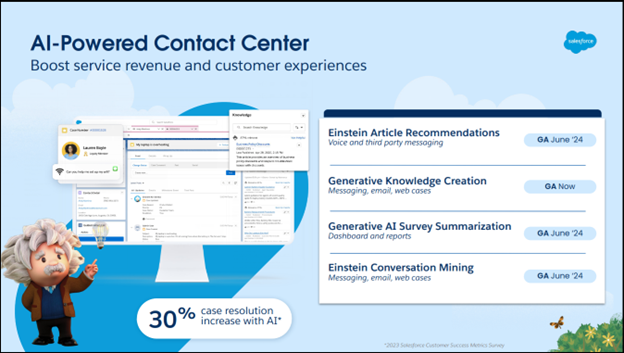While the newsroom post issued by Salesforce today has a much longer title (Salesforce Service Cloud Contact Center Innovations Help Fuel Better Customer Experiences, Revenue Generation Opportunities with Data and AI), the pre-briefing offered to industry analysts last week was very focused on how the company is delivering the Service Cloud AI-Powered Contact Center. With that focal point, you might wonder if Salesforce is finally taking the plunge and entering the incredibly competitive contact center market. As is often true, the answer is yes and no.
Explaining the “no” argument is easy. Ryan Nichols, Salesforce Service Cloud CPO, made this clear in the briefing. The vison is to help companies move beyond a Salesforce desktop with a little pop-up box for the voice channel, over CTI, to “a unified agent experience with a unified data model that comes from a deeply integrated channel approach.”
Nichols explained, “One of the reasons we're at Enterprise Connect is to show these deeply embedded channels not just with Amazon Connect and Genesys, but with our full set of ecosystem partners as well.” In addition to contact center partners, this includes software, consulting, and marketing partners, as seen in the accompanying graphic.
The “yes” answer to the question of whether Salesforce is entering the CCaaS market is more nuanced. The casual observer looking at the slide above, used during the pre-briefing, would be left with the impression that Salesforce offers an AI-Powered Contact Center. To me, however, it is similar to Verint’s Open CCaaS message in June 2023 – the goal is for companies to build their contact center solution stack with Salesforce at its center. Again, similar to Verint, Salesforce is positioning CCaaS as one component of a much larger decision, and they are happy to work with your CCaaS solution of choice.
Is your voice on premises? Salesforce offers a unified desktop, digital channels, GenAI-powered tools, and more. And you can easily move to virtually any CCaaS solution when you are ready to replace your current voice solution. Are you already in the cloud? All the same benefits apply including the newest feature, the ability to bring your CCaaS vendors digital channels (e.g., WhatsApp or email) and have them routed and analyzed by Salesforce. For both premise and cloud contact center customers, Salesforce offers Data Cloud and Tableau analytics to consolidate your customer experience data.
Like many of the CCaaS vendors at Enterprise Connect, Salesforce announced new GenAI features, one with general availability now and others available in the near term. Of the four highlighted in the attached slide, the one I find the most immediately useful to businesses is Generative Knowledge Creation. It allows contact centers to build their knowledge base by automatically creating articles from customer conversations.
“It has always been best to create a knowledge article right at the moment of service, but who has time for that right when service leaders and agents are being asked to do more with less? Being able to look at a new knowledge article screen and have a first draft that is created for you based on the conversation that you just had with customers is really powerful, especially for customers that are dealing with dynamic business environments,” explained Nichols.
Iron Mountain, an American enterprise information management services company that specializes in records management, information destruction, and data backup and recovery services, has already started using the Salesforce Service Cloud Generative Knowledge feature. Einstein automatically creates new knowledge articles after resolved cases. This helps Einstein improve the quality and accuracy of support for similar cases in the future.
As I wrote at the beginning of 2024, there is little question that the proportion of voice interactions coming into the contact center is declining. As companies decide how to best manage the transition to more digital interactions, voice no longer needs to be the first or most crucial decision. Decisions should center on which vendor can best deliver the entire CX stack – including AI, knowledge management, data platform, and the security of both the end customer and the enterprise’s data.










